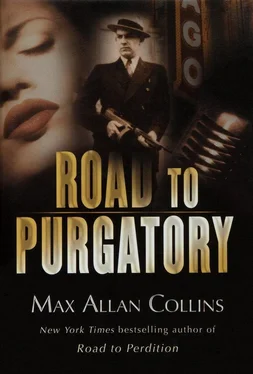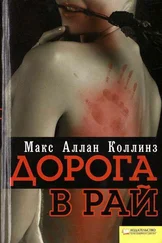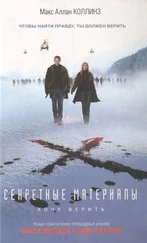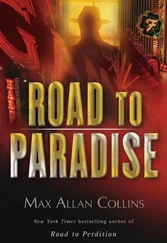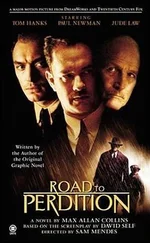“Hi, hero,” Estelle said.
“Hey, I have the day off. Are you home? I can come over any time and move you out.”
“I was calling to try to head you off, in case you got ambitious, Mr. Moving Man. Some old friends dropped by — we’ll be visiting for a while. Can you make it around two?”
It was just after eleven, now.
“Sure. See you then.”
“Michael, I appreciate this. I’m gonna feel a lot better, rooming with you.”
“I’m sorta looking forward to havin’ you in my bed, myself.”
“Naughty boy,” she chuckled.
They hung up, and he folded the book open on the bedstand, figuring to go down to the Seneca coffee shop for a bite. He had stepped into a pair of tan slacks and was just shrugging into a brown sportcoat — having taken the time to sling on the shoulder holster, considering the tensions of late — when somebody knocked at the door.
Withdrawing the .45, Michael strode over and checked the peephole: it was a woman, a blonde (not Estelle, obviously), good-looking it would seem, but through this fish-eye view, who could say?
Still, you never knew, so he opened the door carefully with his left hand, snugging his right-gun-in-hand behind him.
For half a moment he didn’t recognize her, though she hadn’t really changed much if at all. He just didn’t expect to see Patsy Ann O’Hara of DeKalb on the doorstep of Michael Satariano of Chicago.
She looked so business-like, so much... older. She had on a brown tweed Prince Albert reefer-style topcoat, with a wide collar and vaguely military rows of buttons. Purse under her arm, she wore a white scarf bunched at the throat and white gloves and a little side-tilted brown hat with a feather.
“Hey, soldier,” she said, clearly a little apprehensive. “Wouldn’t care to buy a girl some lunch, would you?”
He’d almost forgotten how lovely she was — the big blue eyes with the long lashes, the pert nose, the full lips with that phony perfect beauty mark that happened to be real.
“Patsy Ann,” he said, and warmth flooded through him, and he embraced her, and she embraced him.
Still in his arms, she drew away a little and gazed up at him, clearly wanting to be kissed.
He released her, moved off and made a joke of it, saying, “Hey — I’m not takin’ a girl out for lunch with her makeup mussed... Want to see the digs?”
“Sure,” she said, forcing a smile.
He stepped inside, gun still behind him, and gestured for her to enter; when her back was to him, he slipped the weapon in its shoulder holster. Then he showed her around, and she seemed suitably impressed, though something behind her pleasant expression seemed stiff, even disapproving.
The day was crisp but sunny — he wore a gabardine trenchcoat — as he took his former best girl on his arm, walking the little area that was so much a part of his world. Rush was an around-the-clock street, and had surprisingly little of the tawdry look such areas often did by day, neon glow replaced by an aura of the avantgarde. Nightclubs and many restaurants were closed, but other businesses flourished in the sun: art dealers, bookshops, florists with blooming wares overflowing onto the sidewalk, chic dress shops, and, of course, saloons — even in daylight, this was still Chicago.
As they walked arm-in-arm, further linked by their tan-and-brown clothing, they said nothing. If an underlying awkwardness had accompanied those first minutes, a wordless comfort had already replaced it. They enjoyed each other’s company and were resisting bringing themselves up — to — date, and spoiling everything.
In a roundabout way, they ended up at Little Normandy, a restaurant not so little and which did not keep the implied promise of French food. The old mansion across from the Water Tower was an elegant graystone with a delightful interior-broad open staircase, grand fireplaces, and leaded glass windows, with murals, wood carvings, and ceramic plaques designed by a modern artist who lived upstairs. The bold dramatic artwork struck Michael as cartoony, while (had she been asked) college senior Patsy Ann would have termed it “art moderne with influences ranging from cave drawings to Japanese prints” (but no one asked).
The place was crowded as usual, but the pretty hostess/manager, Celia, recognized Michael and provided a cozy booth in the Black Sheep Bar. Patsy Ann ordered onion soup (a rare French item at the Normandy), and Michael chose hamburger steak with Roquefort sauce, a house specialty.
He had his usual Coca-Cola, and she drank a 7UP while they waited for their lunch. Finally he asked, “What brings you to the big city?”
She leaned forward a little, gloved hands folded on the table cloth. “Well, you know I graduate in June. So I’m interviewing for teaching positions. There’s an opening at a high school in Evanston, and that interview’s at two thirty, and then I have another at Downers Grove, for an elementary. That’s at four thirty.”
“Could be a little tight,” he said. “Opposite sides of the world.”
Nodding, she said, “I know, but these interviews only last about fifteen minutes. It’s mostly your grades and letters of recommendation and... Michael, thank you for not being angry with me.”
“Why would I be?”
She shrugged, leaned back; she looked awfully sweet in that feathered hat; the dress beneath the topcoat had proven to be a smart brown corduroy suit.
“You didn’t want to be crowded,” she was saying. “You made that clear... but you have to admit...” And now she leaned forward again, and gave him a bold little smile. “...you did leave the door open.”
“...Patsy Ann, you know you’ll always have a special place in my heart.”
She frowned. “What a horrible thing to say.”
“What?”
“ That sounded like the door closing. Slamming.”
Her gaze was boring through him. He transferred his attention to the glass of Coke and sipped it, offhandedly saying, “How did you find me?”
“Papa Satariano... Now don’t be mad at him — I know you made him promise not to tell anybody where you were. But I wore him down, Michael — took months to do it... Why haven’t you gone home to visit? Even once? It’s not that far.”
How could he explain how vast the distance was?
“I write once a week,” he said.
“To them. Not to me. Some things never change — it’s like you’re still at war.”
Now she’d stumbled onto it.
He took one of her gloved hands. “I’m involved in something that I... I don’t want to have touch any of the people I care about.”
She swallowed; her frown had worry in it. “You mean, because of these... gangsters you’re in with.”
He frowned. “Papa S. told you that?”
“Eventually... He says you want to get in solid with them, so that someday you can have a restaurant or a nightclub. He says these people control businesses like that — show business, too. Is that true?”
“True enough.”
She put her other hand on top of the one holding hers; she squeezed. Her eyes were urgent. “What if I said I didn’t care?”
“What?”
“What if I said I didn’t care that you were in with gangsters? You think I didn’t see you put that gun away? When was I ever stupid?”
“...Never.”
“Why do you think I’m looking at schools around Chicago? I have an offer at DeKalb Township.”
“I would imagine you get... a lot of offers.”
He wasn’t talking about teaching jobs.
Her chin crinkled as she drew her hand away from his. “I do. I always have had. I can still snap my fingers and get any man on campus.”
“Why don’t you?”
“Because I love you, you selfish son of a bitch.”
Their food came. They picked at it in silence.
Читать дальше
